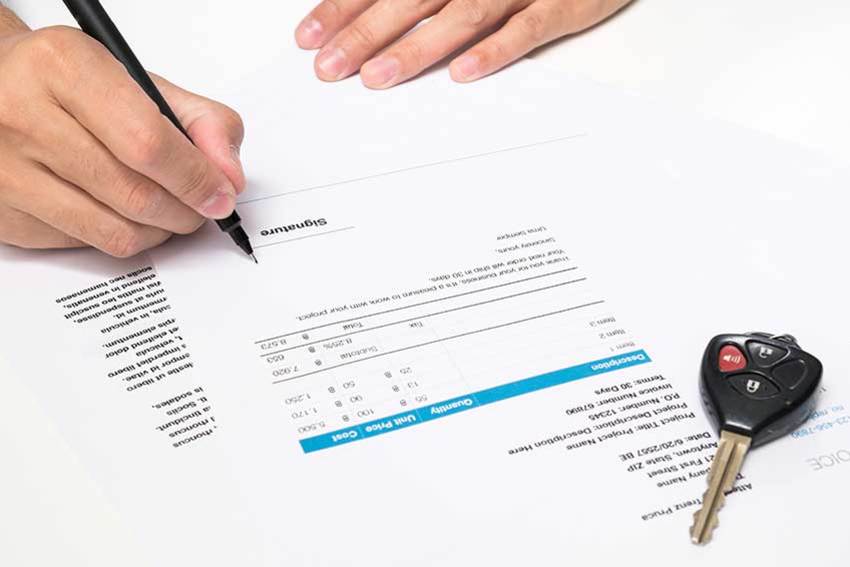5 Essential Documents for Trading In Your Car

When you're looking to trade in your old car, understanding the required documentation is vital to ensure a smooth and efficient transaction. Missing or incorrect documentation can cause significant delays or potentially derail the trade-in entirely. Here are the five essential documents you need to keep handy before heading to the dealership:
1. Title or Loan Documents

The title is the most crucial document when trading in your car. Here’s what you need to know:
- Ownership Proof: The title proves you are the legal owner of the vehicle.
- Loan Status: If you’re still paying off the car, the title will reflect the lienholder’s name until the loan is paid off. Bring loan payoff information to clear the lien on the title during the trade-in process.
- State Variations: Some states require the title, while others might use a certificate of origin or title application for newer vehicles.
Steps for Handling Titles

- Obtain a duplicate title if you’ve misplaced yours.
- Prepare to have the loan paid off and the lien removed from the title before the trade-in.
2. Vehicle Registration

Your car registration serves as an additional proof of ownership and ensures your vehicle is legally allowed on public roads:
- Current Registration: It must be current, and you should have all the required documentation for your state’s registration process.
- Expiration: If your registration is close to or has expired, be prepared to renew it before the trade-in.
3. Insurance Information

Car insurance information is necessary for the following reasons:
- Proof of Insurance: To verify that the car is insured, which can be beneficial for dealerships, especially for cars with remaining loan balances.
- Coverage Transfer: You’ll need to discuss transferring the insurance to your new vehicle or canceling the current policy.
ℹ️ Note: If your insurance company allows electronic policy documents, consider bringing a printed copy or having it accessible on your phone or tablet for quick reference.
4. Odometer Reading

The odometer reading is crucial for:
- Assessing Vehicle Value: It gives a clear picture of the car’s mileage, directly affecting its value.
- Legal Requirements: Many states require an odometer disclosure statement during vehicle sales or transfers.
5. Maintenance and Repair Records

While not legally required, bringing maintenance and repair records can:
- Boost Vehicle Value: Documentation of regular maintenance or recent repairs can increase the trade-in value.
- Transparency: It shows that the vehicle has been well-cared for, providing peace of mind to potential buyers or dealers.
Organizing Your Records

- Collect all service receipts, warranties, or recall notices.
- Organize them chronologically in a folder or binder for easy presentation.
Wrapping up, preparing for a car trade-in involves more than just showing up with your vehicle. Having the right documentation at hand ensures the process goes smoothly. Key documents like the title, vehicle registration, insurance information, odometer reading, and maintenance records play crucial roles in demonstrating ownership, providing transparency, and potentially increasing your car's value.
Remember to organize these documents ahead of time. This preparation will not only save you time at the dealership but can also potentially maximize the return on your trade-in. Keep in mind that while the specifics might differ based on your location, these five documents are fundamental in most trade-in scenarios. So, gear up, gather your paperwork, and head confidently to the dealership knowing you're ready for the trade-in.
What if I’ve lost the title to my car?

+
If you’ve lost the title, you need to contact your state’s DMV or equivalent agency to apply for a duplicate title. There might be fees and a processing time, so it’s wise to do this well in advance of your trade-in appointment.
Is maintenance history really important when trading in my car?

+
Yes, having a detailed maintenance history can increase the value of your car at trade-in. It provides a record of regular servicing and can demonstrate the care taken with the vehicle, potentially making it more attractive to dealers.
Can I still trade in my car if I still owe money on it?

+
Absolutely, but you’ll need to pay off the remaining loan amount, either from the proceeds of the trade-in or out of pocket. Be prepared with loan payoff details to facilitate a smooth process.



